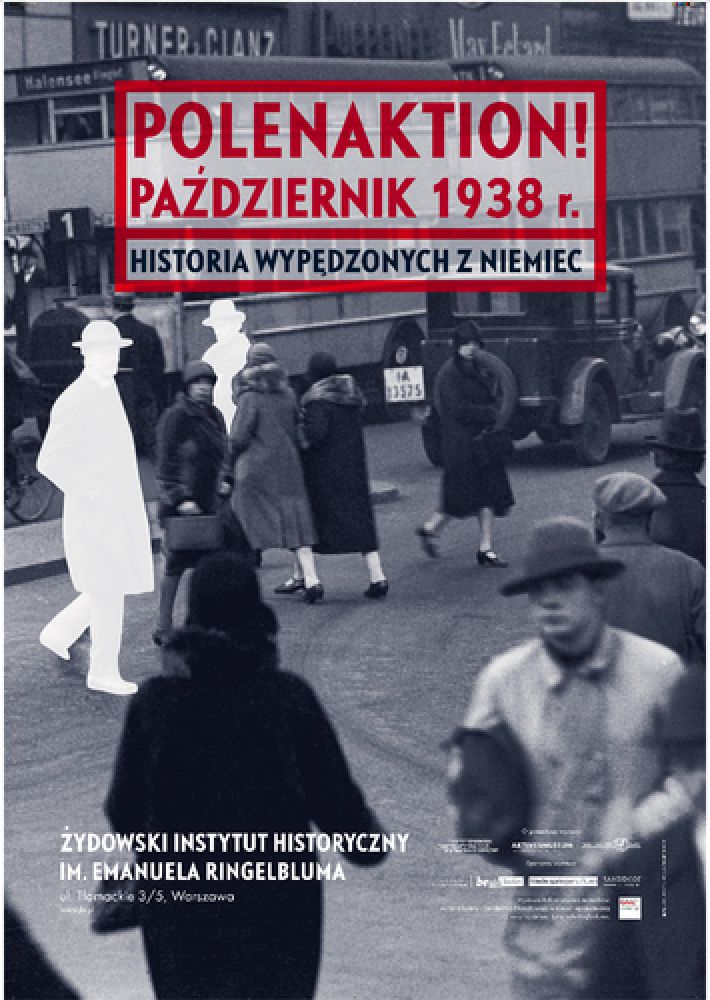- News
- Events
- Oneg Shabbat
- Collections
- Research
- Exhibitions
- Education
- Publishing Department
- Genealogy
- About the Institute
- Bookstore


On 31 March 1938, the Polish Sejm, expecting mass returns of Polish Jews living in Germany to their homeland, passed the deprivation of citizenship law. According to the bill, Polish citizens who have spent at least 5 years abroad continuously after the establishing of the Polish State, could have lost their citizenship. In mid-October 1938, the Interior Minister issued a regulation which obliged every Polish citizen staying abroad to register their passport at their nearest consulate and to obtain a control note confirming the validity of the document. Passport without the note didn’t allow to cross the Polish border after 29 October 1938.
On 26 October 1938 Reinhard Heydrich, chief of the Reich main security office, announced that all Polish Jews would be immediately expelled from Germany. Entire families, single men and women, children and youth without adult guardians were all deported alike. The procedure was conducted in big cities as well as in small villages.
On 28 October, about 17,000 Jewish citizens of Poland found themselves on border stations of Zbąszyń, Bytom, near Chojnice and Wschowa. Several thousand of them had the status of stateless persons. Majority of them (about 8,000) had been moved to Neu Bentschen (today Zbąszynek), from where they had been led through the border to the Polish town of Zbąszyń, located on the Berlin-Warsaw train line and inhabited by about 5,400 people. A temporary refugee camp was established in the former military barracks.
Jewish aid organizations such as JOINT as well as the Polish Red Cross quickly organized help. In early November, the General Committee To Aid Refugees From Germany was established. It was directed by Dr Mojżesz Schorr, a rabbi from Warsaw. The organization coordinated many local committees. In Warsaw, Bund and class labour unions had founded the Workers’ Aid Committee. Press was publishing announcements calling to collect food, clothing, blankets and money for the deported.
The deported people were living in old military stables, a school, a mill, old shooting range, sports hall by the local stadium. Wealthier refugees were renting rooms from the Zbąszyń locals. In the city, a Jewish hospital, school, kitchens, post office, clothing storage and immigration office were established, as well as a choir and a sports club, which was playing football matches against the local team. Woodwork and sewing courses were organized. A special office helped search for families, and a child care department took care of children, especially those deported without their parents.
Emanuel Ringelblum went to Zbąszyń at the order of Icchak Giterman, in order to coordinate help on behalf of JOINT for five weeks. This work revealed Ringelblum’s talent for management and solving problems. He was encouraging the refugees to write accounts of the deportation, which he considered an unprecedented event in the Jewish history, and to speak Yiddish (he even invited Noe Nachbusz, a Warsaw actor who was playing in Yiddish). His Zbąszyń experience was later applied in work for the Jewish Social Self-Help in the Warsaw Ghetto, as well as for the Oneg Shabbat group.
--------------------------
The exhibition presented at the Emanuel Ringelblum Jewish Historical Institute recalls the events from October 1938. The history of Polenaktion is seen there through the lens of biographies of individual victims. The leading motif of the exhibition are stories of six Jewish families from Berlin. The exhibition consists of three parts in chronological order: „Life in Berlin before 1938”, „Deportations in October 1938”, „The history of persecution and rescue”.
The exhibition was developed by the History Department of the East European Institute of the Freie Universität Berlin and the Aktives Museum in Berlin, as a part of commemorative events of the Polenaktion in 2018.
The exhibition was presented at the Stiftung Neue Synagoge Berlin – Centrum Judaicum between 8 July 2018 and 28 February 2019. Over 40.000 guests visited the exhibition.
Sponsors of the exhibition:
![MKiDN_logoeng.jpg [90.00 KB]](https://www.jhi.pl/storage/image/core_files/2020/10/8/ba54cfa7fde05feddcb693c8b0ae4361/jpg/jhi/preview/MKiDN_logoeng.jpg)
The exhibition received financial support from the resources of the Ministry of Culture and National Heritage, as a part of commemorative events of the 75th anniversary of Emanuel Ringelblum’s death.
Admission:
Monday – Friday: 9.00 am – 6.00 pm (last entrance at 5 pm), standard ticket: 15 zł
Sunday: 10.00 am – 6.00 pm (last entrance at 5 pm), free admission only for individuals visitors.